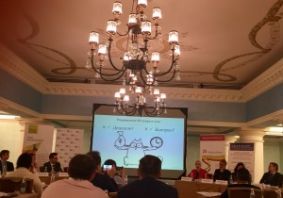Russia as a Place for Dispute Resolution, Annual ICC Conference in Moscow on 7 December 2016
 CIS Arbitration Forum was an information partner of the annual ICC National Committee (ICC Russia) conference ‘Russia as a Place for Dispute Resolution’.
CIS Arbitration Forum was an information partner of the annual ICC National Committee (ICC Russia) conference ‘Russia as a Place for Dispute Resolution’.
This year the topic at the forefront of the discussions included the arbitration reform in Russia and its first ramifications for the arbitration industry and business.
The Reform of Arbitration Courts: first conclusions
Session 1 comprised speakers from several fields of legal industry who presented different perspectives at the effects of new Russian arbitration legislation. Ms Alexandra Usacheva, Ministry of Justice of Russia, urged arbitration centers, both Russian and foreign, to prepare and file application for the licenses as soon as possible, rather than to wait for November 2017 – the deadline for the centers to administer disputes without licenses. According to Ms. Usacheva, Ministry of Justice has already received an application from one foreign arbitration center (not disclosed).
Mr Timur Aitkulov, Clifford Chance, looked at the reform from the business perspective and pointed out as one of its potential consequences that Russian companies might more frequently structure their share purchase agreements through offshore corporate schemes. Mr Steven Finizio, Wilmer Hale, characterized the reform as ‘a huge step forward making Russia more attractive and huge benefit for legal market’, as it has potential to increase confidence and predictability of Russian arbitration system.
Prof Alexey Kostin, International Commercial Arbitration Court at the Russian Chamber of Commerce and Industry, pointed as one of the consequences of the reform for the ICAC its new powers to administer domestic disputes and announced the plans to launch the ICAC branches in several Russian cities: Rostov-na-Donu, Ufa and Irkutsk.
Territories of rapid growth: the development of international arbitration in Asia and Latin America
Session 2 comprised the most international panel of speakers who discussed various aspects of arbitration in their jurisdictions and how Russian parties can benefit from it. Prof Anton Asoskov, Lomonosov Moscow State University, starting the discussion with the reasons why Russian parties can have interest in looking at the Asian and Latin American arbitration centers, highlighted the differences between the approaches towards the Russia-related sanctions of EU and non-EU arbitration centers.
Mr Mingchao Fan, ICC China, reported that in 2015 ICC China administered 26 disputed with Russian parties. Ms Olga Boltenko, CMS Hasche Sigle, Hong Kong, presenting the benefits of arbitration in Hong Kong, highlighted that in 2016 it ranked 1st in Asia and 4th worldwide for its judicial independence.
Arbitration of Intellectual Property Disputes: protecting the interests of Russian companies
Session 3 was dedicated to the range of problems arising in IP disputes and how arbitration can help to tackle them efficiently. Ms Natalia Guliaeva, Hogan Lovells, dispelled a myth that IP disputes and arbitration are incompatible by sharing her practical experience of advising clients in transnational projects. She emphasized the advantages of arbitration over litigation in complex multi-jurisdictional IP disputes and concluded that arbitration can resolve them in the most time- and cost-saving manner.
Focusing on a particular procedural advantage of arbitrating IP disputes – presentation of evidence, Ms Elena Trusova, Goltsblat BLP, pointed out that arbitration is perfectly suitable for IP disputes as it gives more space for creativity in evidentiary matters, which is crucial for hearing IP disputes.
Mr Maxim Kulkov, Kulkov, Kolotilov and Partners, spoke about the peculiarities of protecting project documentation copyright in arbitration based on his professional experience. He focused on the jurisdictional issues related to the scope of arbitration agreements that arose in complex design and construction projects.
Life after Yukos: challenges to recognition and enforcement of arbitral awards set aside at the seat
Final session moderated by Mr David Goldberg, White & Case, discussed the approaches of national courts in several jurisdictions towards recognizing and enforcing arbitral awards annulled by the courts at the seat of arbitral proceeding. Ms Marina Akchurina, Cleary Gottlieb Steen & Hamilton LLC, provided an overview of Russian legislation on this matter and focused on the details of Russian court enforcement proceedings of the award set aside in Turkey in the case Ciments Francais.
Looking at other jurisdictions, Mr Kenneth D. Beale, Boies, Schiller & Flexner LLP, UK, discussed the approach of national courts in France – classical example of jurisdiction allowing recognition and enforcement of set aside arbitral awards – and mentioned new draft of French law on the sovereign immunity. He also looked in details at the practice of the US courts, mentioning Chromalloy and Pemex cases.
Concluding the session, David Goldberg said that it is still too early to draw any conclusions for practice from Yukos case, providing a short update of Yukos enforcement proceedings in Germany, India, US, UK and France. Currently French courts mostly consider the ownership over particular assets by Russia, rather than the enforceability of the set aside arbitral award itself.
Concluding remarks
Despite the efforts of the Russian arbitration reform to make arbitration in Russia more attractive by increasing its predictability and certainty, many old and new legal challenges for authorities, legal practitioners, business and arbitration centers remain. It goes without saying that there will be definitely lots to discuss during the next annual ICC Russia dispute resolution conference.
For the photos from the event, check here.











